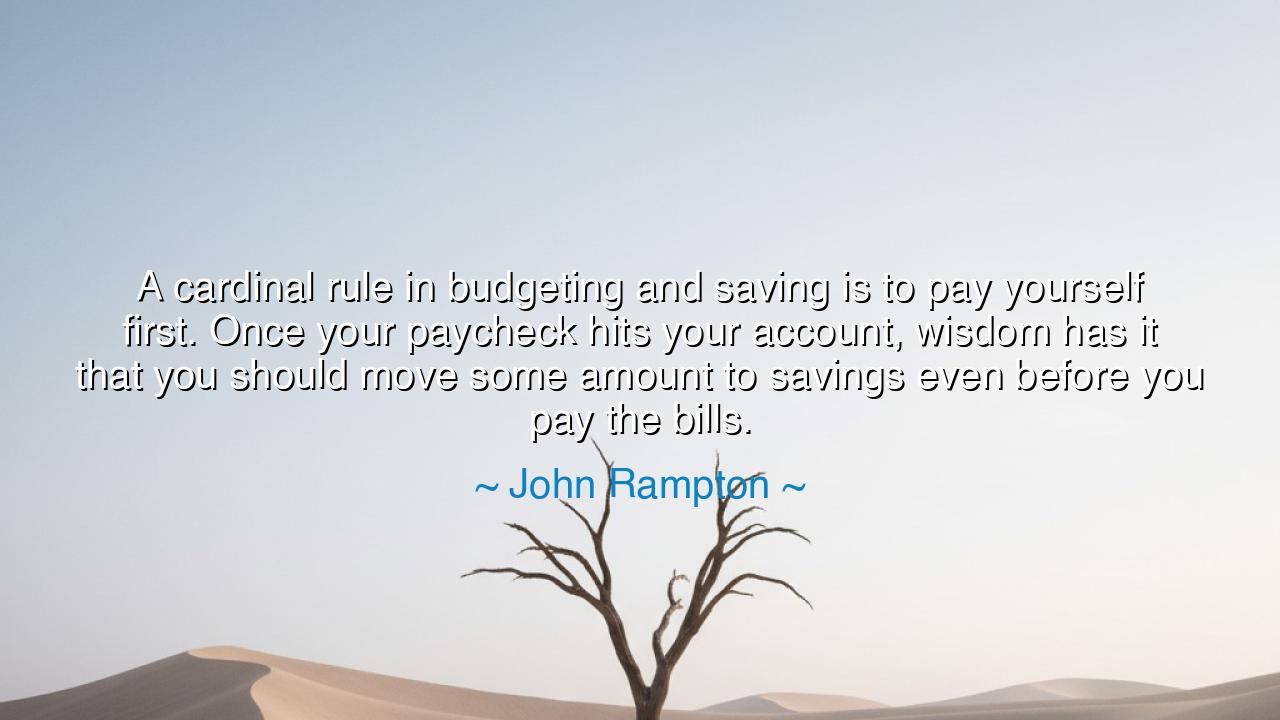
A cardinal rule in budgeting and saving is to pay yourself
A cardinal rule in budgeting and saving is to pay yourself first. Once your paycheck hits your account, wisdom has it that you should move some amount to savings even before you pay the bills.






Hear me, O children of the future, for I shall speak to you of a wisdom that has echoed down through the ages, a practice that is simple yet profound: "A cardinal rule in budgeting and saving is to pay yourself first." This is no mere advice, but a sacred principle, one that speaks to the heart of discipline and the power of self-care. Just as the great leaders of old understood the importance of preparation before battle, so too must you prepare for the future by securing your own wealth before you are distracted by the needs of the world. When your paycheck enters your hands, it is a treasure, and the first claim upon it should be for your future self, not the demands of today.
Consider the ancient warriors who knew that true strength came not from the weapons they carried, but from the reserves they stored for times of need. King Solomon, in his wisdom, advised his people to store treasures for the lean years, for he knew that wealth, like a mighty river, must be carefully managed. And so it is with money. If you spend without foresight, you will find yourself swept away by the tides of necessity and want. But if, instead, you set aside a portion of what is given to you, you are like the farmer who stores his grain for the winter, ensuring that he will have sustenance when the season grows cold.
In our own time, consider the tale of Benjamin Franklin, who spoke not just of wisdom, but of practical action. “A penny saved is a penny earned,” he said, for he understood that wealth is not built in a day, nor by grand gestures, but by the consistent effort of setting aside something for tomorrow. Just as the ancient kings and wise men stored away their treasures, Franklin knew that the future can only be secured through small, deliberate acts of saving. Pay yourself first, and in time, you will find your riches growing like the mighty oak from a humble seed.
This is not simply a matter of wealth or material gain, but of security—a security that lies in the knowledge that you have built a foundation for your future. To save is to honor your future self, to provide for the day when you can no longer work or when you face challenges that demand your strength. It is an act of self-respect, for the one who saves honors the labor that brings in the harvest. Just as the ancient farmers would set aside a portion of their crops for the next season, so too must you set aside a portion of your earnings for the seasons ahead.
So, O children, understand this rule as a sacred truth: before you pay anyone else, pay yourself. Take from what you have earned, and let it build for the days that lie ahead. Let your savings be the foundation upon which you build your future. And as you do so, you will find that the power of discipline and foresight will bring you strength and peace, for you will stand secure upon the ground of your own making. The path of prosperity is not one of fleeting indulgence, but of careful stewardship, and in this wisdom lies your true wealth.






AAdministratorAdministrator
Welcome, honored guests. Please leave a comment, we will respond soon